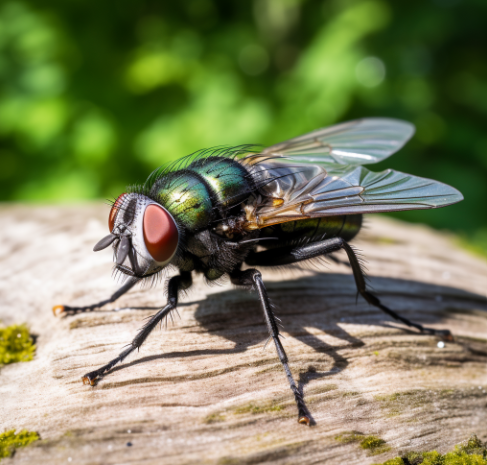Are you tired of flies buzzing around your home or outdoor space? Flies are not only annoying, but they can also carry diseases and germs. While commercial fly repellents are available, they can contain harsh chemicals that may be harmful to you, your family, and the environment. Fortunately, there are natural fly repellents that are effective in keeping flies away without the use of chemicals.
Understanding flies is the first step in finding a natural repellent that works for you. Flies are attracted to food, garbage, and other organic matter. They are also attracted to warmth and light, making your home or outdoor area the perfect spot for them to gather. By keeping your space clean and free of food scraps, you can help reduce the number of flies in your area. Natural fly repellents work by masking scents that attract flies or by repelling them with strong smells.
Key Takeaways
- Natural fly repellents are effective in keeping flies away without the use of harsh chemicals.
- Flies are attracted to food, garbage, warmth, and light, making your home or outdoor space the perfect spot for them to gather.
- Natural fly repellents work by masking scents that attract flies or by repelling them with strong smells.
Understanding Flies
Flies are one of the most common flying insects that can infest your home. They can be a nuisance and a health hazard, as they carry disease-causing bacteria and viruses. Understanding the behavior and biology of flies can help you prevent infestations and keep your home free of these pests.
Types of Flies
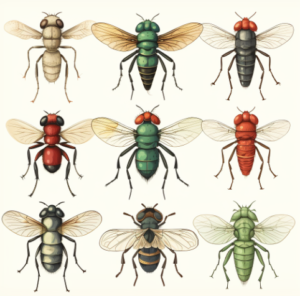
There are many different types of flies, but some of the most common ones that you may encounter in your home include:
- Houseflies: These are the most common type of fly found in homes. They are attracted to food and moisture and can carry disease-causing bacteria and viruses.
- Fruit flies: These small flies are attracted to ripe and rotting fruits and vegetables. They can quickly multiply and become a nuisance.
- Blow flies: These flies are attracted to dead animals and decaying organic matter. They can be a sign of a larger pest problem.
- Gnats: These small flies are often found near plants and can be a nuisance.
Fly Behavior
Flies have a short lifespan, but they reproduce quickly. Female flies can lay hundreds of eggs at a time, and these eggs can hatch into larvae within a day. Flies are attracted to food, moisture, and warmth, and they can enter your home through open doors and windows.
Once inside, flies will search for food and breeding sites. They are attracted to moist and decaying organic matter, such as garbage, compost, and pet waste. Flies can also lay their eggs on food, which can lead to contamination and illness.
Preventing Fly Infestations
To prevent fly infestations in your home, it is important to keep your home clean and free of food and moisture sources. Here are some tips to keep flies away:
- Keep your kitchen clean and free of food debris.
- Store food in sealed containers.
- Take out the garbage regularly and keep it in a sealed container.
- Clean up pet waste promptly.
- Repair any leaks or moisture problems in your home.
- Use screens on doors and windows to prevent flies from entering.
By understanding the behavior and biology of flies, you can take steps to prevent infestations and keep your home free of these pests.
Natural Fly Repellents
Flies are not only annoying but can also carry diseases. Using natural fly repellents is a safe and effective way to keep these pesky insects away from your home. Here are some of the best natural fly repellents that you can use:

Herbs and Spices
Herbs and spices are not only great for cooking but can also be used as natural fly repellents. Some of the most effective herbs and spices include:
- Basil
- Mint
- Lavender
- Rosemary
- Cloves
- Cayenne pepper
You can use these herbs and spices in different ways. For example, you can make a sachet with dried herbs and place it in areas where flies are present. You can also make a spray by mixing essential oils with water and spraying it around your home.
Vinegar
Vinegar is a versatile natural fly repellent that can be used in different ways. You can make a trap by mixing equal parts of apple cider vinegar and water in a bowl and adding a drop of dish soap. Flies will be attracted to the smell of vinegar and will drown in the liquid.
You can also use vinegar as a spray by mixing it with water and spraying it around your home. The strong smell of vinegar will keep flies away.
Essential Oils
Essential oils are concentrated plant extracts that have many benefits, including repelling flies. Some of the best essential oils for repelling flies include:
- Peppermint
- Eucalyptus
- Lemongrass
- Citronella
- Tea tree
You can use these essential oils in different ways. For example, you can make a spray by mixing a few drops of essential oil with water and spraying it around your home. You can also make a sachet with dried herbs and a few drops of essential oil and place it in areas where flies are present.
Other Natural Fly Repellents
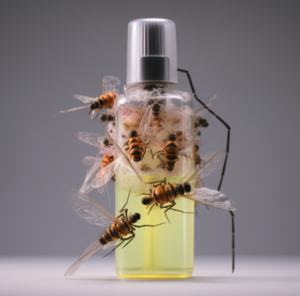
Other natural fly repellents that you can use include:
- Flypaper
- Mosquito netting
- DIY fly traps
- Fans (flies don’t like moving air)
In conclusion, natural fly repellents are a safe and effective way to keep flies away from your home. You can use herbs and spices, vinegar, essential oils, and other natural repellents to keep your home fly-free.
Essential Oils as Fly Repellents
Essential oils have been used for centuries as natural remedies and insect repellents. They are extracted from plants and contain the plant’s natural fragrance and properties. Essential oils can be used to repel flies and other insects, and they are a safe and natural alternative to chemical insecticides.
Here are some essential oils that are effective at repelling flies:
- Lavender oil: Lavender oil has a sweet, floral scent that repels flies. It also has antiseptic and anti-inflammatory properties.
- Peppermint oil: Peppermint oil has a strong, minty scent that flies dislike. It also has antiviral, antifungal, and antibacterial properties.
- Citronella oil: Citronella oil has a citrusy scent that repels flies. It is also commonly used in candles and outdoor sprays.
- Lemongrass oil: Lemongrass oil has a lemony scent that flies find unpleasant. It also has antibacterial and anti-inflammatory properties.
- Eucalyptus oil: Eucalyptus oil has a fresh, minty scent that repels flies. It also has antiseptic and anti-inflammatory properties.
To use essential oils as fly repellents, you can add a few drops to a diffuser or mix them with a carrier oil and apply them to your skin or clothing. You can also make a natural fly spray by mixing essential oils with water and a little bit of dish soap.
It’s important to note that essential oils should be used with caution, as they can be toxic if ingested in large quantities. Always dilute essential oils before using them and avoid using them around pets and children.
In conclusion, essential oils are a safe and effective way to repel flies and other insects. They are a natural alternative to chemical insecticides and can be used in a variety of ways. By using essential oils, you can enjoy a fly-free environment without exposing yourself and your family to harmful chemicals.
Herbs and Plants as Fly Repellents
If you’re looking for natural ways to keep flies away from your home or garden, using herbs and plants is a great option. Not only do they smell great, but certain herbs and plants are known to repel flies and other insects.
One herb that is particularly effective at repelling flies is basil. You can plant basil in your garden or keep a few pots on your windowsill to keep flies away. Rosemary is another herb that works well as a fly repellent. Not only does it smell great, but it also has antiseptic properties that can help keep your home clean and free of bacteria.
Flowers can also be used to repel flies. Marigolds are a great option, as they are easy to grow and have a strong scent that flies don’t like. Plant them around your garden or in pots on your patio to keep flies away during the summer months.
If you have an herb garden, you can also try planting catnip. While it may attract cats, it can also repel flies and other insects. Another option is to plant Venus flytraps or other fly-trapping plants. These plants are carnivorous and can help keep your home or garden free of flies.
In addition to planting herbs and plants, you can also use them to make natural fly repellents. For example, you can make a basil and lemon spray by boiling fresh basil leaves in water and adding lemon juice. This can be sprayed around your home or garden to repel flies.
Overall, using herbs and plants as fly repellents is a natural and effective way to keep flies away from your home and garden. Try planting some of these herbs and flowers or making your own natural repellents to see what works best for you.
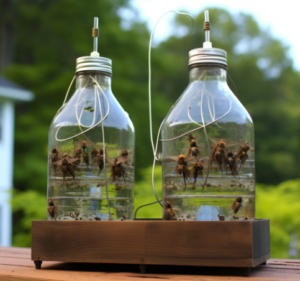
Homemade Fly Repellents
If you’re looking for a natural and cost-effective way to keep flies away, then homemade fly repellents are the way to go. You can easily make these repellents with ingredients that you already have at home.
Homemade Fly Spray
A homemade fly spray can be made using essential oils, vinegar, and water. You can use any essential oil that has insect-repelling properties such as lavender, peppermint, or eucalyptus. Mix 10-15 drops of essential oil with one cup of water and one cup of vinegar in a spray bottle. Shake well and spray in areas where flies are present.
Homemade Fly Traps
Homemade fly traps are an effective way to catch and kill flies. Here are a few simple DIY fly traps that you can make at home:
- Compost Bowl Fly Trap: Fill a bowl with compost and cover it with plastic wrap. Poke several holes in the plastic wrap and leave it in an area where flies are present. The flies will be attracted to the compost and will get trapped in the bowl.
- Soda Bottle Vinegar Trap: Cut a plastic soda bottle in half and fill the bottom half with vinegar. Invert the top half and place it inside the bottom half like a funnel. The flies will be attracted to the vinegar and will get trapped in the bottom half of the bottle.
- Homemade Flypaper: Mix equal parts of corn syrup, sugar, and water in a saucepan and bring it to a boil. Let it cool and then soak strips of brown paper in the mixture. Hang the strips in areas where flies are present.
Spray Bottle Fly Repellent
Another easy way to keep flies away is by using a spray bottle fly repellent. Mix equal parts of water and vinegar in a spray bottle and add a few drops of essential oil such as peppermint or eucalyptus. Shake well and spray in areas where flies are present.
By using these homemade fly repellents, you can keep your home fly-free without the use of harmful chemicals.
Using Food and Household Items
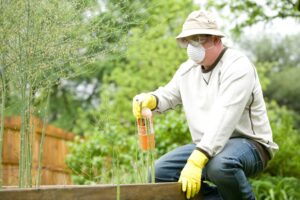
You might be surprised to learn that many common food and household items can be used as natural fly repellents. Here are some items you can use to keep flies away:
Vinegar
Vinegar is a versatile household item that can be used to repel flies. You can use white vinegar or apple cider vinegar. Here are some ways to use vinegar as a fly repellent:
- Mix equal parts of water and vinegar in a spray bottle and spray it around the house to repel flies.
- Soak a cloth or paper towel in vinegar and place it in areas where flies are a problem, such as near garbage cans or in the kitchen.
Citrus
Flies are repelled by the scent of citrus fruits. Here are some ways to use citrus as a fly repellent:
- Cut a lemon or lime in half and place it in areas where flies are a problem, such as near windows or doors.
- Make a citrus spray by boiling citrus peels in water for 10 minutes. Let the mixture cool, strain it, and pour it into a spray bottle. Spray it around the house to repel flies.
Cloves
Cloves have a strong scent that repels flies. Here are some ways to use cloves as a fly repellent:
- Place whole cloves in a bowl of water and place it in areas where flies are a problem, such as near windows or doors.
- Make a clove spray by boiling cloves in water for 10 minutes. Let the mixture cool, strain it, and pour it into a spray bottle. Spray it around the house to repel flies.
Cinnamon
Cinnamon has a strong scent that repels flies. Here are some ways to use cinnamon as a fly repellent:
- Place cinnamon sticks in areas where flies are a problem, such as near windows or doors.
- Make a cinnamon spray by boiling cinnamon sticks in water for 10 minutes. Let the mixture cool, strain it, and pour it into a spray bottle. Spray it around the house to repel flies.
Fruits
Overripe fruits can attract flies, but some fruits can also repel them. Here are some fruits you can use as fly repellents:
- Cucumber: Cut a cucumber into slices and place them in areas where flies are a problem, such as near windows or doors.
- Cayenne pepper: Mix cayenne pepper with water and spray it around the house to repel flies.
Bay Leaf
Bay leaf has a strong scent that repels flies. Here are some ways to use bay leaf as a fly repellent:
- Place bay leaves in areas where flies are a problem, such as near windows or doors.
- Make a bay leaf spray by boiling bay leaves in water for 10 minutes. Let the mixture cool, strain it, and pour it into a spray bottle. Spray it around the house to repel flies.
Dirty Dishes and Garbage
Dirty dishes and garbage can attract flies. Here are some tips to keep flies away:
- Keep your kitchen clean and free of food scraps.
- Take out the garbage regularly and keep the lid on the garbage can closed.
- Rinse dishes and put them in the dishwasher or wash them right away.
Vodka
Believe it or not, vodka can be used as a fly repellent. Here’s how:
- Mix equal parts of water and vodka in a spray bottle and spray it around the house to repel flies.
By using these natural fly repellents, you can keep your home fly-free without using harmful chemicals.
Commercial Fly Repellents
If you’re not keen on making your own natural fly repellent, there are plenty of commercial options available on the market. These products are often designed to be easy to use and provide quick relief from flies and other pests.
When choosing a commercial fly repellent, it’s important to consider the active ingredients. Two of the most common active ingredients in commercial fly repellents are Picaridin and DEET. Picaridin is a synthetic compound that is similar to the natural compound piperine, found in black pepper plants. DEET is a synthetic compound that has been used as an insect repellent since the 1940s.
Some commercial fly repellents also contain neem, a natural insecticide derived from the seeds of the neem tree. Neem has been used for centuries in traditional medicine and is known for its insecticidal properties.
It’s important to follow the instructions on commercial fly repellents carefully. Some products may need to be reapplied frequently, while others may have a longer-lasting effect. Be sure to use the product as directed to ensure maximum effectiveness.
When using commercial fly repellents, it’s also important to take precautions to avoid contact with your eyes and mouth. Wash your hands thoroughly after applying the product, and avoid touching your face until the product has dried completely.
Overall, commercial fly repellents can be a convenient and effective way to keep flies and other pests at bay. Just be sure to choose a product with the right active ingredients for your needs and follow the instructions carefully for best results.
Scientific Evidence Supporting Natural Fly Repellents
There is scientific evidence supporting the use of natural fly repellents. Many studies have reported the effectiveness of plant-based repellents against different types of flies, including house flies, stable flies, and Anopheles mosquitoes.
One study found that lemongrass oil can be an effective repellent against stable flies. The study showed that wax-based catnip pellets spread in the manure/soil areas of cattle feedlots resulted in over 99% repellency of stable flies.
Another study found that plant extracts or essential oils can be effective in repelling malaria vectors worldwide. The study aimed to assess the effectiveness of plant-based repellents against Anopheles mosquitoes.
Furthermore, timed-release aerosol pyrethrin dispensers can be effective against flies confined in enclosed spaces. Toxic baits have limited use in urban settings.
The fact that several compounds found in plants are repellent to haematophagous insects could be an evolutionary relict from a plant-feeding ancestor. Many of these compounds evolved as repellents to phytophagous insects, and this repellent response to potentially toxic compounds is well conserved in the lineage of Diptera (True Flies).
In conclusion, scientific evidence supports the use of natural fly repellents. Plant-based repellents can be effective in repelling different types of flies and mosquitoes. Timed-release aerosol pyrethrin dispensers can also be effective against flies confined in enclosed spaces.
Preventing Fly Infestations
Flies are a common household problem that can be both annoying and unsanitary. Fortunately, there are several natural methods that you can use to prevent fly infestations in your home.
Keep Your Home Clean
The best way to prevent flies from entering your home is to keep it clean. Flies are attracted to food and other organic matter, so it is important to keep your kitchen and other areas where food is prepared or consumed clean and free of crumbs and spills. Regularly clean your floors, countertops, and other surfaces to eliminate any potential food sources for flies.
Use Fly Traps
Fly traps are a simple and effective way to get rid of flies. There are several types of fly traps available, including light traps, sticky traps, and plastic bag traps. Light traps use ultraviolet light to attract flies, while sticky traps and plastic bag traps use a sticky substance to trap flies. Consider using these traps in areas where flies are most common, such as near windows and doors.
Let in Sunlight
Flies are attracted to dark, damp places, so letting in sunlight can help prevent fly infestations. Open your curtains and blinds during the day to let in natural light, and keep your home well-ventilated to prevent moisture buildup.
Use Liquid Soap
Liquid soap can be an effective natural fly repellent. Mix a few drops of liquid soap with water in a spray bottle, and spray the solution around your home to repel flies. This method can be particularly effective in areas where flies are most common, such as near windows and doors.
By following these simple tips, you can prevent fly infestations in your home and enjoy a cleaner, more sanitary living space.
Frequently Asked Questions
What are some effective natural ingredients for making fly repellent?
There are several natural ingredients that are effective in repelling flies, such as essential oils like peppermint, eucalyptus, lemongrass, and lavender. Other natural ingredients that work well include vinegar, cloves, cinnamon, and citronella.
What are some non-toxic fly repellents for outdoor use?
If you’re looking for a non-toxic fly repellent for outdoor use, try using a mixture of apple cider vinegar and water in a spray bottle. You can also use citronella candles, which emit a scent that repels flies. Another option is to use a fan to create a breeze, which will help keep flies away.
How can I make a homemade fly repellent without essential oils?
If you don’t have essential oils on hand, you can still make a homemade fly repellent using other natural ingredients. One option is to mix equal parts water and white vinegar in a spray bottle. You can also try making a mixture of water, lemon juice, and witch hazel.
What are some natural ways to keep flies away from my skin?
To keep flies away from your skin, try using a natural insect repellent that contains essential oils like peppermint, eucalyptus, or lemongrass. You can also try wearing light-colored clothing, which is less attractive to flies than dark-colored clothing. Additionally, avoid wearing perfumes or scented lotions, as these can attract flies.
What are some fly-repelling scents that I can use indoors?
There are several scents that can help repel flies indoors, such as lavender, peppermint, and eucalyptus. You can use these scents in the form of essential oils, candles, or diffusers. Another option is to make a potpourri using dried herbs like lavender, rosemary, and thyme.
What are some natural fly repellents that are safe for human use?
Many natural fly repellents are safe for human use, such as essential oils like peppermint, eucalyptus, and lemongrass. Other natural ingredients that are safe include vinegar, citronella, and witch hazel. However, it’s important to use these ingredients in moderation and to avoid getting them in your eyes or mouth.




